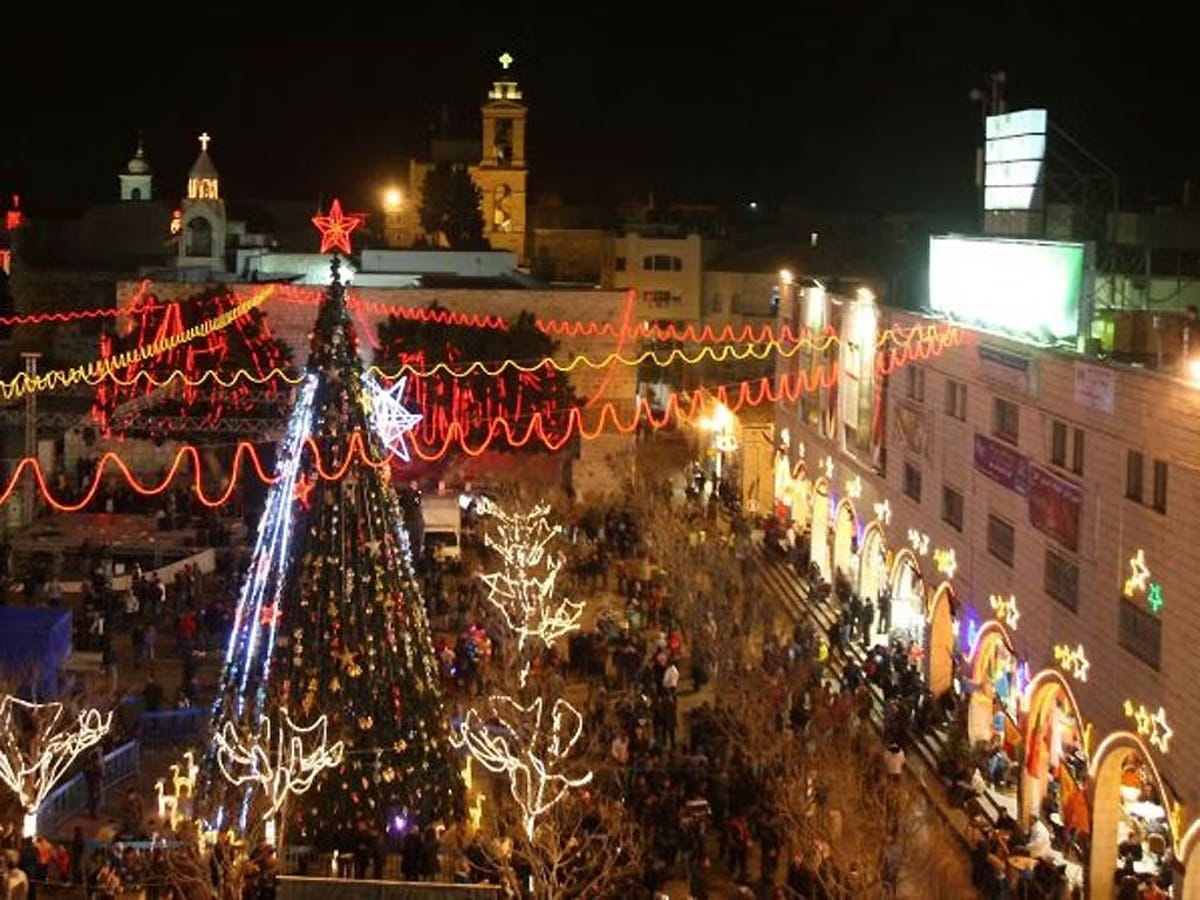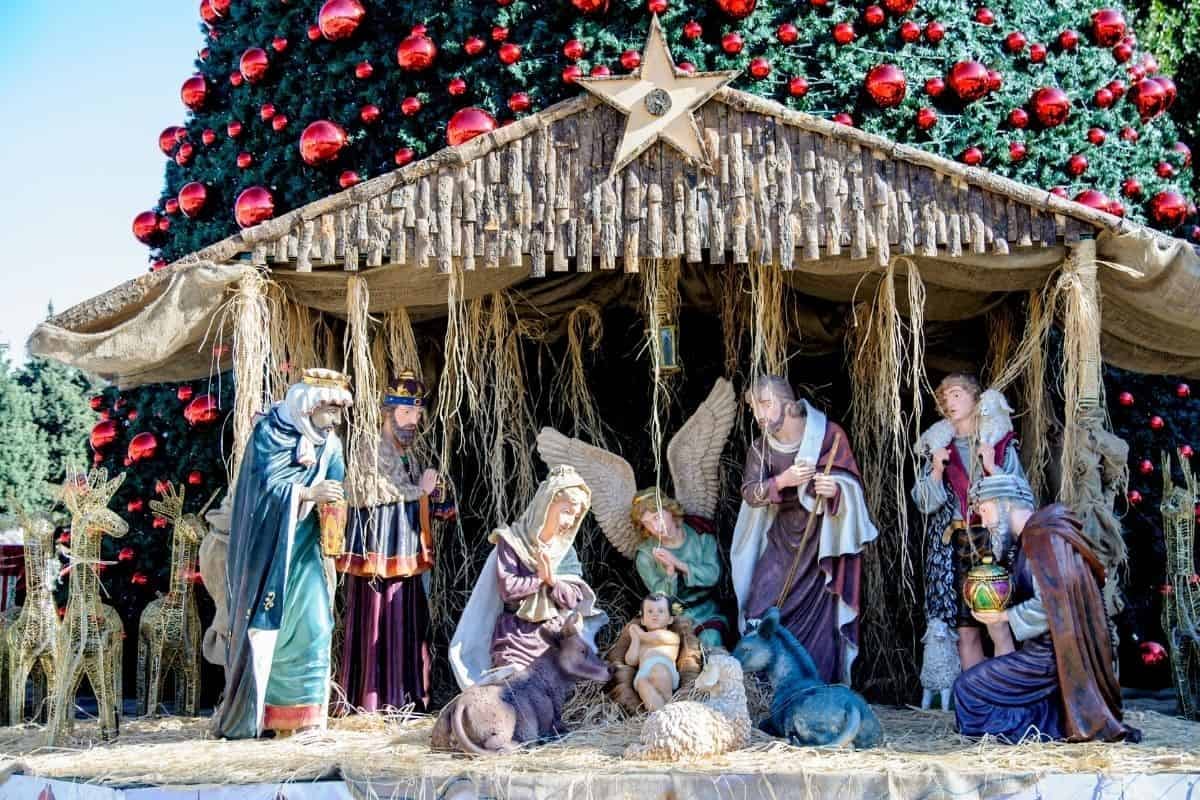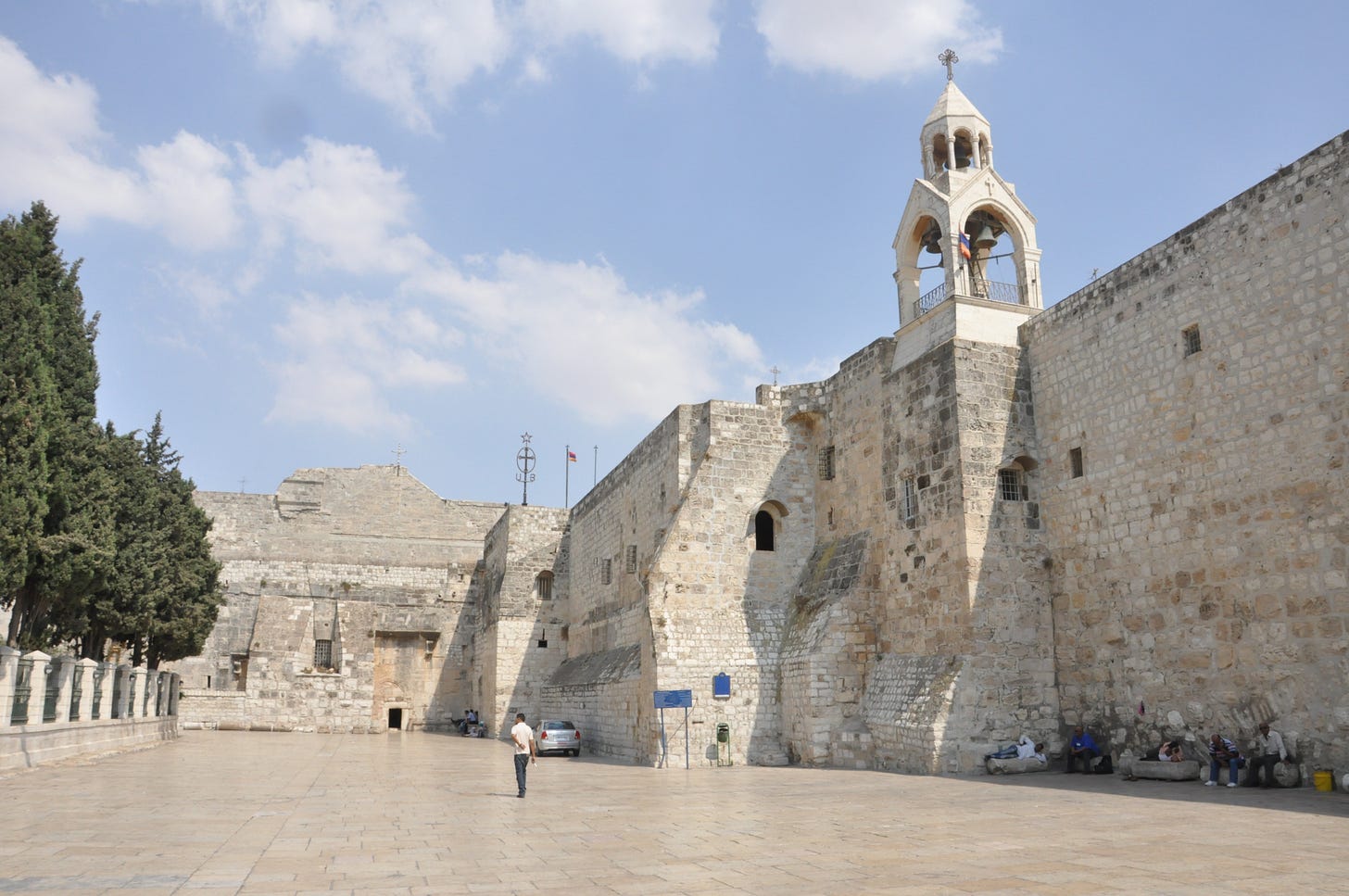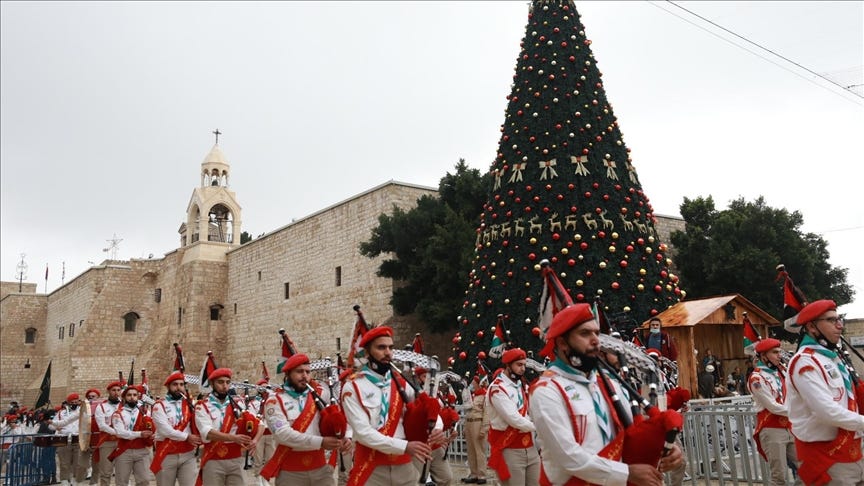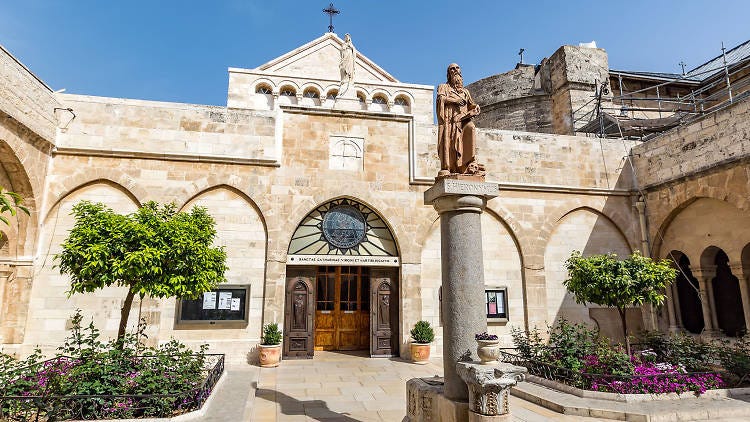Christians in Palestine resolve to observe "Black Christmas" in Bethlehem this year
The decision to observe 'Black Christmas' is a poignant move to highlight internationally the plight of Palestinian Christians, caught in the Hamas-Israel cross-fire.
Navigating the Crossroads of Conflict: The Christian Minority in Palestine
In the midst of the longstanding Israel-Hamas conflict, a narrative largely perceived through the Muslim-Jew dichotomy, the plight and perspectives of Palestinian Christians often remain overlooked. Bethlehem, a city etched deeply in Christian lore as the birthplace of Jesus Christ, sits at the epicenter of this turbulent region. Recent years have witnessed a significant shift in the religious and demographic fabric of Palestine, affecting its Christian minority profoundly. This article aims to shed light on the Christian community in Palestine, exploring their current circumstances and the profound symbolism behind their decision to observe a 'Black Christmas' in Bethlehem this year and try to answer other frequently-asked-questions. This observance, marked by solemnity and solidarity, reflects a community grappling with the complexities of faith and identity in a land torn by conflict.
Christian Population in Palestine: An Overview
As of 2023, the State of Palestine, encompassing the West Bank and Gaza Strip, has an estimated population of 5,235,192. According to the Palestinian Central Bureau of Statistics (PCBS), Christians comprise around 2% of this population, amounting to approximately 104,703 individuals. The majority of these Christians, about 93,000, reside in the West Bank, while the Gaza Strip is home to a smaller Christian population of around 11,700, representing about 0.5% of its population.
This demographic shift is not recent but a continuation of a long-term trend. In 1922, Christians constituted 9.5% of Palestine's population, which decreased to 7.9% in 1946 and further to 2.5% in 2015. Factors contributing to this decline include emigration for better economic opportunities and a more peaceful environment, assimilation through intermarriage, and instances of religious persecution, particularly during times of conflict.
The Context of 'Black Christmas' in Bethlehem
Bethlehem, known for its historical and spiritual significance in Christianity, has traditionally been a focal point for Christmas celebrations. However, this year, Palestinian Christian leaders across denominations in the West Bank City have taken a conscious decision to forego all festivities. This resolution is a gesture of solidarity with their fellow-citizens in Gaza, not just the Christian brethren, currently facing Israeli bombardments and a humanitarian crisis.
The cancellation of public celebrations, including the absence of Christmas lights and decorations in Manger Square, is a response to the ongoing conflict affecting the Gaza Strip. Pastor Munther Isaac from Bethlehem's Evangelical Lutheran Christmas Church described the situation as a "genocide," with a significant number of people, estimated to be around 1.7 million, displaced.
Bethlehem, the Birthplace of Jesus Christ
Bethlehem is traditionally recognized as the birthplace of Jesus Christ. This belief is based on the narratives found in the New Testament, particularly in the Gospels of Matthew and Luke. According to these accounts, Jesus was born in Bethlehem, a town in Judea, to Mary and Joseph. The significance of Bethlehem as the birthplace of Jesus is a central element in Christian theology and has made the city a major site of Christian pilgrimage.
Bethlehem, located in the West Bank, is now a Palestinian city and holds immense religious significance not only for Christians but also in the context of Jewish and Islamic traditions. The Church of the Nativity in Bethlehem is one of the oldest continuously operating churches in the world and is traditionally considered to be located over the spot where Jesus was born. The Church is a UNESCO World Heritage Site and attracts thousands of pilgrims and tourists from around the world, peaking at Christmas.
Navigating Bethlehem's Complex Administration: International Access Controlled by Israel
Bethlehem, located in the West Bank, is officially under the administrative jurisdiction of the Palestinian Authority (PA). However, the reality of its governance is more complex due to the Israeli military occupation that has been in place since the 1967 Six-Day War. The Oslo Accords of the 1990s granted the PA limited self-governance in certain areas, including Bethlehem, categorized as Area A where the PA has civil and security control. Despite this, the broader West Bank is intricately divided into Areas A, B, and C, reflecting the ongoing territorial and political nuances of the Israeli-Palestinian dispute. Efforts to resolve this vexed issue, notably the two-state solution, face substantial obstacles, influencing the current dynamics of the region.
Crucially, international access to Bethlehem is controlled by Israel. This means that visitors, including U.S. passport holders, must navigate Israeli travel regulations, even when their destination is within the Palestinian territories. Typically, U.S. citizens can visit Israel without a visa for up to 90 days for tourism purposes. Entry into Bethlehem for these visitors commonly involves traveling from Ben Gurion Airport near Tel Aviv to Jerusalem and then crossing Israeli military checkpoints to enter the West Bank. It is essential for travelers to be prepared for security procedures and to carry the necessary documentation, ensuring their passport is valid for at least six months beyond their travel dates. This arrangement underscores the unique and complex nature of accessing Bethlehem, a city of profound historical and religious significance, yet situated at the heart of a deeply contested and politically sensitive area.
The Plight of Gaza's Christians
In Gaza, the Christian community, though small, faces a crisis. The Israeli airstrikes have led to the destruction or damage of nearly all homes in the Christian community of Gaza City. The oldest active church in Gaza, which provided shelter to some, was also hit. This has resulted in most of Gaza's Christian population becoming homeless, with a significant portion choosing to leave the territory if they hold foreign passports.
Advocacy for Peace: Palestinian Christians Seek International Support
The plight of Palestinian Christians has not adequately captured the world's attention, prompting a delegation's journey to Washington, D.C., to advocate for an end to hostilities and highlight the struggles of their community, often overlooked by international media. Engaging with U.S. Congressmen, they presented a strongly-worded memorandum to President Biden, underscoring the urgent need for a comprehensive cease-fire and the pursuit of peaceful resolutions.
Pastor Munther Isaac, leader of the delegation, upon his return to Bethlehem for the Advent season, plans to create a symbolic Nativity display amidst ruins. The scene, adorned with rocks and debris, poignantly symbolizes the harsh realities faced by the community. “Christmas for us has transformed into a reflection of Jesus’s birth amidst those who have lost everything, amidst destruction,” Pastor Isaac remarked, encapsulating the profound impact of the conflict on their traditional celebrations and faith.
Palestinian Christians: Condemning Extremism and a Plea for Justice
The Palestinian Christian delegation, vocal in its criticism, has unequivocally condemned the actions of both extreme-right elements within Israel's Jewish political landscape and the militant group Hamas. It expresses deep concern over the growing intimidation and hostility towards Palestinian Christians in the West Bank and Jerusalem, attributing this to the emboldening of Jewish extremists by Israel’s far-right factions within the Netanyahu government. Pastor Munther Isaac articulates this sentiment clearly, stating, “We feel Jewish extreme radicals want us out of Jerusalem and they’re working on it and they’re going unchecked.”
Furthermore, while the delegation has strongly and unequivocally denounced Hamas for its acts of violence, including the killing of innocent civilians and the taking of hostages, they also question the motives behind Israel's ultra-aggressive stance towards an organization ingrained in Palestinian society. They argue that this approach, perceived as a form of revenge rather than a strategic response, overlooks the historical context of the conflict. Pastor Isaac remarks, “As horrifying as October 7 was, things did not start there,” highlighting the complexity of the situation and the necessity of understanding the long-standing nature of these hostilities in addressing the current crisis. This critical perspective from the Palestinian Christian delegation underscores their call for a more nuanced approach that considers the broader historical and societal dynamics at play.
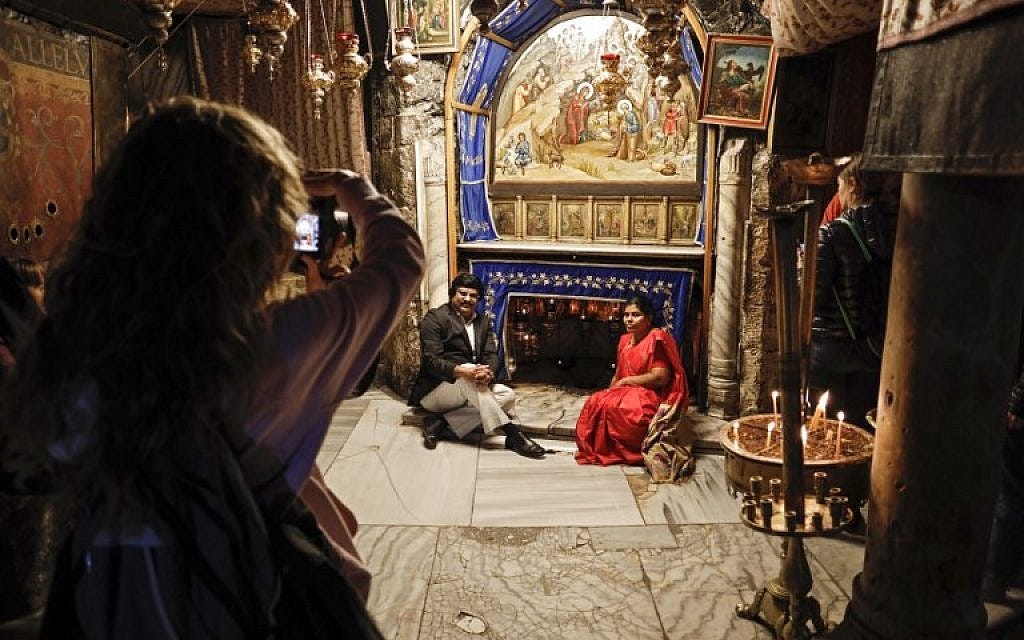
A Plea in Bleak Times: The Poignant Message of Bethlehem's 'Black Christmas'
The current circumstances in Palestine, especially the challenges faced by its Christian minority, demand immediate global attention and action. The decision to observe 'Black Christmas' in Bethlehem transcends mere symbolism; it is a powerful testament to the region's ongoing hardships and an ardent plea for peace and justice. This somber commemoration serves as a crucial call to the international community, emphasizing the need for active engagement and meaningful solutions. While discussions about a two-state solution continue, the unique struggles of Palestinian Christians, citizens of the State of Palestine, are often sidelined. In a poignant and perhaps ironic twist, this year's 'Black Christmas' in Bethlehem may cast a much-needed spotlight on their plight, serving as a compelling appeal to global leaders and policymakers. This observance could become a catalyst for change, drawing attention to the necessity of addressing the needs and rights of all communities in this embattled land.
Reflecting on Religious Harmony: A Perspective from Secular Bharat
This observance of 'Black Christmas' in Palestine may also offer indirect solace to the Christian minority in secular India, a nation where discrimination is notably absent. Instead, the Indian Constitution upholds "cultural and educational rights" as Fundamental Rights for its religious and linguistic minorities. These rights, which are not extended to the majority community in the same manner, underscore India's commitment to equality and religious harmony, and protection to its minorities.


